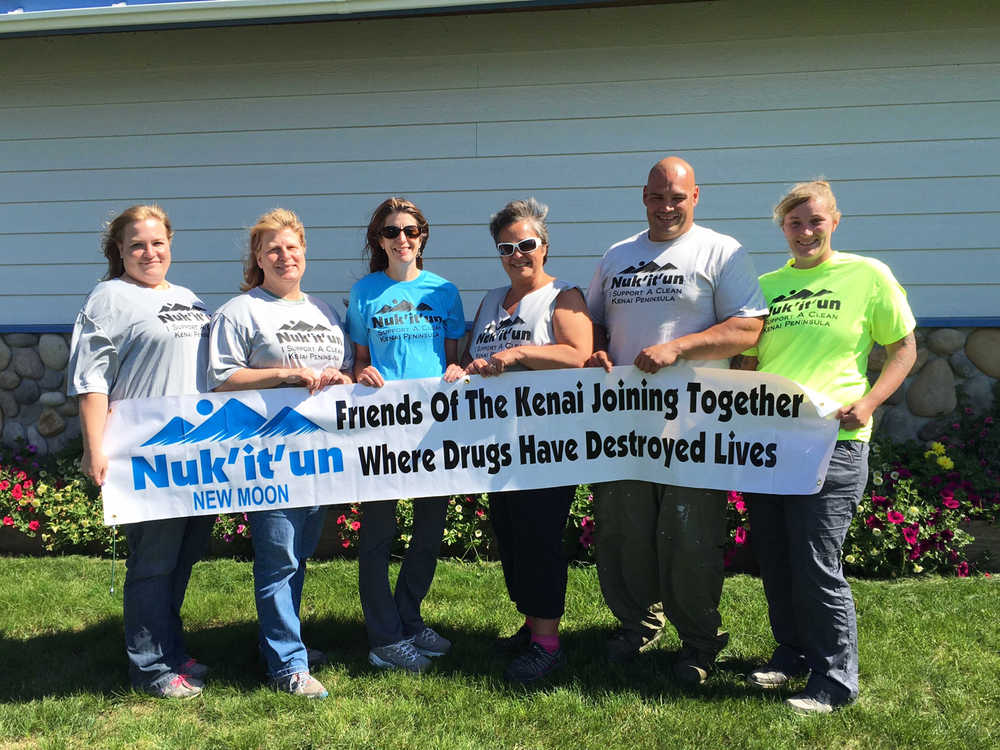Whether directly or indirectly, the effects of drug abuse eventually touch everyone — that’s the philosophy on which a group of concerned community members based the idea for an organization that’s working toward a solution.
Nuk’it’un, which is Dena’ina for “new moon,” had its first meeting last year with the goal of providing more education and resources for those struggling with addiction. Members of Nuk’it’un have recently opened a long-term sober living home for men in the Kalifornsky Beach Road area in order to give recovering addicts a safe place to go during transition.
Ravin Swan, the nonprofit’s president, said she began looking into options about three years ago when her son was using drugs so that she could be prepared to help him, and was shocked at the lack of local support she found.
“Our belief is, you know, anytime anybody wants help, they truly want the help, they should have the resources right there available, and there is not,” she said. “We’re lacking in counseling.”
“Treatment beds,” added board director Beth Selby, who works in behavioral health at Wildwood Correctional Center.
“Detox,” added Valerie Anderson, another board director.
The rate of inpatient hospitalizations coded for heroin poisoning nearly doubled from 2008 to 2012 in Alaska, according to a State of Alaska Epidemiology report released last year.
But it’s not just heroin users Nuk’it’un seeks to help. Someone in recovery from any addiction is welcome at the sober living home, which members of the group have leased since July thanks to the help of a volunteer donor.
“Our main requirements are that they’ve had to go through a treatment center,” Swan said, explaining that the home is a place people can stay while working on their next phases of recovery. “Our goal is just to bring them to a sober, clean home and we ask them to stay with us for one year.”
“You just have to want to stay clean and sober,” Anderson added.
Nuk’it’un members will also help residents in the sober home connect with other services they may need, like job placement or further education. The hope is to eventually bring tradesmen into the home to host workshops and classes, Anderson said.
“Six years ago I lost my daughter. Today is her birthday,” she said in a Thursday interview. “She’d be 31. It was drug related, I’m sure. So that’s why I’m so passionate about it. People need help.”
Selby said there are not enough supportive places for addicts on the Kenai Peninsula to turn even with resources like the Serenity House Treatment Center in Soldotna.
“With Palmer (Correctional Center) shutting down, and with Senate Bill 91 and major changes in sentencing requirements now, we’re going to have a lot of people who aren’t going to be going to jail, or who are going to be going to jail for shorter amounts of time, and so they’re out there with no sober place to go,” Selby said. “So there’s going to be more of them that are going to be in need of sober housing — all types of housing — so I think this need is even greater now with the changes in corrections.”
The recently opened sober home has a capacity to house 10 people at a time and a house manager who himself has been clean 20 years.
Applications are available now and there is already one resident. Making the application process as simple as possible was important to think about when opening the house, Selby said.
The sober home costs nothing to join, but Nuk’it’un members will request residents put in for occupancy fees once they have stable employment, Swan said. She hopes the house will be self-sufficient after its first year.
There are plans for more sober living homes in the future, especially one for women, the members said. Nuk’it’un members will also work with other citizen groups like the Change 4 the Kenai Coalition, which hosted two large town hall meetings in Kenai earlier this year.
Now that Change 4 the Kenai has secured some funding, Swan said Nuk’it’un is waiting to see what the coalition’s next steps will be in order to not duplicate efforts.
“Some of the things that we talked about that we want to do is get education going, get some more drug awareness education into our school district,” she said. “More peer support that we need in our community. Peer support for people that are addicted but also peer support that we need for loved ones that are dealing with (it).”
Nuk’it’un is also building relationships with Serenity House and the Alaska Department of Corrections, its members said. The group meets from 6-7:30 p.m. monthly in the Kenaitze Tribal Courthouse conference room. Their next meeting is Thursday, Aug. 11.
Swan, Anderson and Selby spoke of how the community tends to stigmatize people who are struggling with addictions, and the misunderstanding that they are choosing to use. This is where they believe education and awareness can come in to change the community outlook and bring people closer to a solution.
“It is a disease, and people really need to realize that, and bring that negativity out of our community and help these people,” Swan said.
Reach Megan Pacer at megan.pacer@peninsulaclarion.com.

